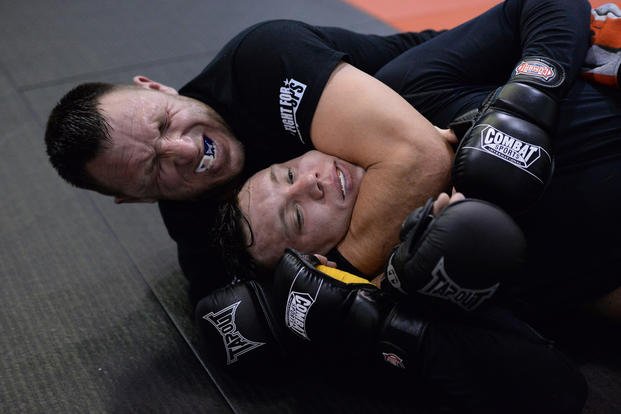Playing combative sports prior to serving in the military develops a candidate's competitive nature, physical and mental toughness, and provides unique training in many elements of physical fitness. With any contact sport, there is a risk for injury so the timing in your training with these sports can be the difference of you making your ship date ready to go or finding yourself seriously delayed due to injury and rehabilitation time.
Here is an email from a young man preparing to serve who has been doing a variety of martial arts throughout his life:
Stew, this is a broad question, but do you think combative sports help guys develop a tougher mindset for SOF [special operations forces] selection? For instance, if someone were to train jiu jitsu or boxing on top of their SOF specific workout programming, what advice would you have? Thanks, Joe
Joe -- great question. I think some sort of competitive/team activity prior to serving is a great way to prepare yourself in addition to just doing push-ups and running. I have always said that a wrestler who can swim is a top candidate for SEAL training, since those candidates usually display toughness, pound-for-pound strength, muscle stamina and endurance.
There are also some intangible skills. When you have a coach who sees you succeed and fail repeatedly and corrects you with coaching feedback, developing the ability to handle that feedback and adjust will be beneficial in your military career.
Personally, handling negative feedback (when you perform a skill incorrectly) is one priceless benefit that will not just help you with military training, but in any situation for the rest of your life. You do not get good at sports or these types of combative situations without knowing how to learn during stress.
Are combatives necessary? Not really, but they can be very helpful since you will be tasked with a variety of combative events when in the military, especially in the special operations world. Combat training requires it.
Having something in your athletic, work, school or personal history that has created a level of toughness in you will go hand in hand with your progress in learning new combative methods of defending yourself and becoming an offensive weapon as well.
However, there is something primal that clicks with many people when they first experience this level of one-on-one, combative situation. A flight-or-flight response is triggered, and you may find yourself doing things in a violent way that is completely foreign to your background.
We all have that ability, especially in life-or-death situations whether they're real or perceived. So I would not necessarily say you are behind the power curve if you missed out on life in a dojo.
There is also the chance of injuring yourself and creating delays to your ship date or even disqualifying yourself from military service. I have seen many people lose their opportunity to serve in their desired military capacity by breaking hands, joints or other bones, or by getting severe concussions or surgeries months before their military commission or enlistment. This is heartbreaking, but it also can be avoided by setting a logical time frame where you stop doing potentially dangerous training prior to your enlistment date.
At six months out, my recommendation is to avoid sparring and training inexperienced people in combative sports. You should also avoid things like road bike riding (triathlon training), long endurance races, contact sports and other potentially dangerous activities that really will not make a difference to your selection success.
Spend that time focusing on the specifics of your future high attrition rate training program and avoid doing things that do not support that specific focus. Save your sparring and potentially dangerous combative events until after your training. You will be useful in your special ops unit with these skills and can help and hone others in your team.
On a side note, the skills of knowing how to handle negative feedback and performing well under stress does not have to be sports-related. Learning music in a band, performing in a school play and just life in general can provide the skills to handle negative feedback. These activities will help you master a skill under stress. Some methods are much less painful than others.
-- Stew Smith is a former Navy SEAL and fitness author certified as a Strength and Conditioning Specialist (CSCS) with the National Strength and Conditioning Association. Visit his Fitness eBook store if you're looking to start a workout program to create a healthy lifestyle. Send your fitness questions to stew@stewsmith.com.
Want to Learn More About Military Life?
Whether you're thinking of joining the military, looking for fitness and basic training tips, or keeping up with military life and benefits, Military.com has you covered. Subscribe to Military.com to have military news, updates and resources delivered directly to your inbox.














